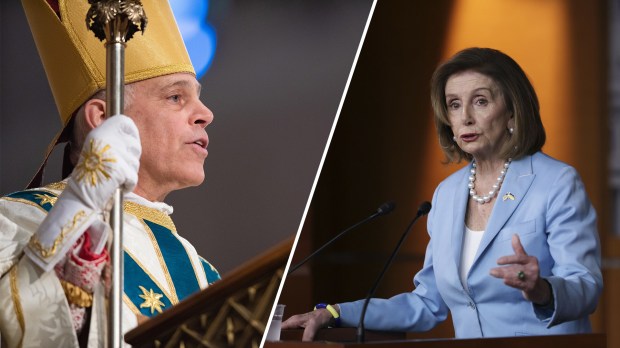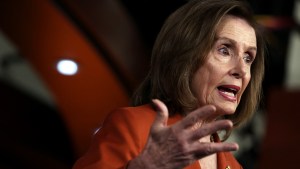Central to the decision by San Francisco Archbishop Salvatore Cordileone to deny Communion to Speaker of the House Nancy Pelosi is the reality of scandal. As Bishop Michael Burbidge of Arlington, Virginia, said in repeating the ban, the aim of these decisions is “to guard the faithful from scandal.” Other bishops have also cited scandal in statements supporting Archbishop Cordileone.
But what does “scandal” actually mean in a case like this?
Certainly the issue here is not scandal in its everyday sense–an expression of more or less mild disapproval (“It’s a scandal the way that man talks about himself all the time”) or even aesthetic distaste (“It’s a scandal to charge so much to see such a lousy movie”).
Instead, when bishops talk about scandal in a situation like this one, the word has the sense explained by the Catechism of the Catholic Church: “Scandal is an attitude or behavior which leads another to do evil.”
“The person who gives scandal becomes his neighbor’s tempter. He damages virtue and integrity; he may even draw his brother into spiritual death. Scandal is a grave offense if by deed or omission another is deliberately led into a grave offense,” the catechism says (CCC 2284).
Does Mrs. Pelosi’s behavior fit that description? What Archbishop Cordileone, Bishop Burbidge and the others have in view is her repeated, high-visibility championing of even such radical pro-abortion measures as the deceptively named Women’s Health Protection Act (S. 4132), which was passed by the House of Representatives but failed in the Senate last February.
Among other things, that bill would have imposed abortion on demand nationwide, overridden parental notification and informed consent laws, required taxpayer support of abortion, and called into question the right of health care providers to refuse on conscience grounds to participate in abortions.
For Speaker Pelosi to support this measure and still receive Communion is scandal in the sense specified by the Catechism—leading others to believe this is something a good Catholic can do.
“Scandal takes on a particular gravity by reason of the authority of those who cause it,” the CCC says. But politicians aren’t alone—the catechism also mentions business leaders, teachers, “manipulators of public opinion,” and anyone who wields the power to lead others into sin. “Scandal can be provoked by laws or institutions, by fashion or opinion,” it notes.
In saying this, I am not passing judgment on any bishop who has wrestled with the question of withholding Communion and come to a different conclusion. The implications of sanctioning so powerful a political figure as the Speaker of the U.S. House of Representatives are truly intimidating.
Furthermore, I agree that the Eucharist has medicinal value—as Archbishop Michael Jackels of Dubuque points out, it’s a “healing remedy” for sinners (a category that includes all of us) and one rightly approached by those who need its help, as in fact we all do. But the Eucharist isn’t magic. It’s a healing remedy for those who admit their fault and repent, not those who deny and persist.
If ever there was an issue where unity among the bishops was necessary, it’s this one. Contrary to our pro-abortion media, what’s involved here isn’t a clumsy attempt to strongarm Mrs. Pelosi into abandoning her support for abortion but a decision by conscientious pastors to address a situation of scandal that arguably ought to have been confronted many years ago. Better late than never, you might say. And let us pray Mrs. Pelosi finally sees the light.



